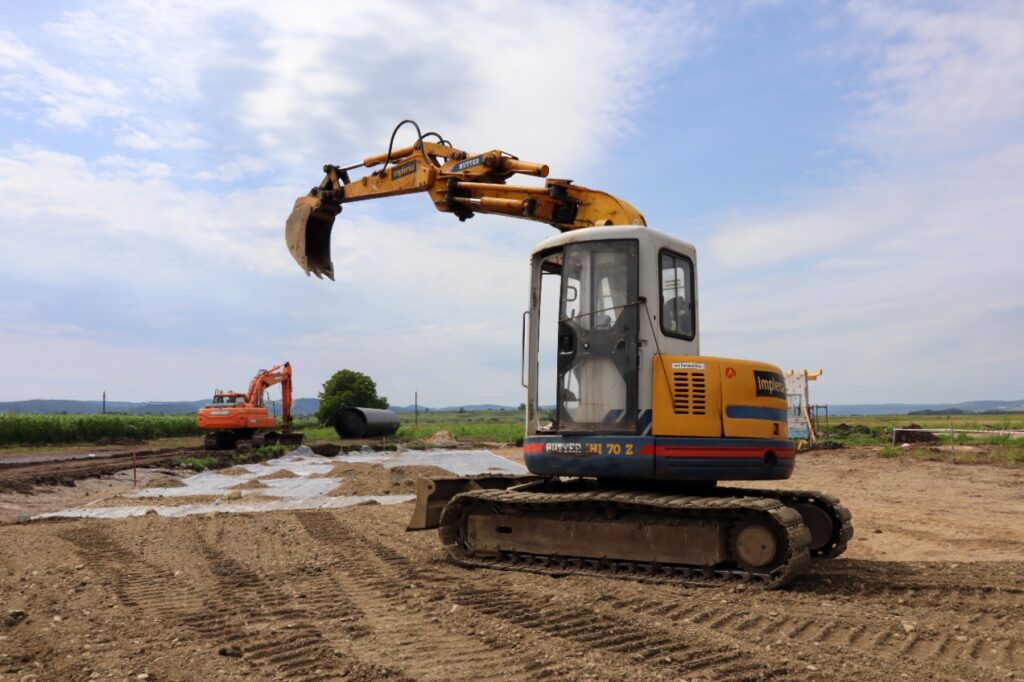
Revolutionizing Road Construction: Embracing Modern Techniques and Technologies
Road construction plays a pivotal role in infrastructure development, connecting communities, facilitating transportation, and driving economic growth. In recent years, the industry has witnessed a transformation fueled by modern techniques and technologies that have significant improved efficiency, sustainability, and safety in construction projects.
Introduction
Gone are the days of manual labor and traditional methods dominating road construction. Today, advancements in technology have revolutionized every stage of the construction process, from surveying and planning to execution and maintenance. In this article, we’ll delve into the modern techniques and technologies shaping the future of road construction.

GPS Technology in Surveying and Planning
One of the game-changers in road construction is GPS technology. By leveraging GPS-enabled devices and software, construction teams can conduct precise surveys, gather accurate data, and streamline project planning. Real-time tracking of equipment and materials, coupled with digital mapping tools, has eliminated guesswork and reduced errors, leading to more efficient project timelines and cost savings.
Drones in Construction Monitoring
Another innovation making waves in the industry is the use of drones for construction monitoring. Drones equipped with high-resolution cameras and sensors can capture aerial footage, conduct surveys, and monitor progress on construction sites. This real-time data allows project managers to make informed decisions, identify potential issues early, and ensure compliance with design specifications. Additionally, drones enhance safety by reducing the need for personnel to work in hazardous or hard-to-reach areas.
Advanced Materials and Recycling
In the quest for sustainability, road construction has embraced advanced materials and recycling techniques. Recycled asphalt, rubberized asphalt, and reclaimed concrete are being used to create durable and eco-friendly pavements. Not only do these materials reduce waste and conserve natural resources, but they also offer cost savings and enhanced performance, making them a win-win solution for infrastructure projects.
Smart Construction Equipment
The era of smart construction equipment has dawned upon us, with machines like excavators, bulldozers, and rollers incorporating advanced technologies. Automated features, telematics systems, and predictive maintenance tools optimize equipment performance, minimize downtime, and improve safety on construction sites. These intelligent machines are paving the way for increased productivity and reduced environmental impact.
3D Printing and Prefabrication
Innovations such as 3D printing and prefabrication are revolutionizing how road construction components are manufactured. Custom-designed parts can be produced with precision and efficiency, reducing material waste and labor costs. 3D-printed bridges, prefabricated drainage systems, and modular pavement sections are reshaping the construction landscape, offering faster construction timelines and enhanced project quality.
Sustainable Practices
Sustainability is no longer an afterthought but a core principle in road construction. Green pavement designs, stormwater management solutions, and energy-efficient lighting are just some examples of sustainable practices gaining traction. These initiatives not only reduce the environmental impact of road projects but also contribute to long-term resilience and resource conservation.
Challenges and Opportunities
While the adoption of modern techniques and technologies brings immense benefits, it also comes with challenges. Initial investment costs, training requirements, and regulatory compliance are some hurdles that construction companies face. However, these challenges present opportunities for innovation, collaboration, and continuous improvement within the industry. Investing in technology and training is an investment in the future of sustainable infrastructure development.
Case Studies
Several successful road construction projects showcase the effectiveness of modern techniques and technologies. From the use of GPS-guided equipment to the implementation of recycled materials, these projects demonstrate the tangible benefits of embracing innovation. Lessons learned from these case studies inform best practices and inspire future projects to strive for excellence and sustainability.
Case Study 1: The Netherlands' Smart Highway Project
Project Overview:
The Netherlands’ Smart Highway project aimed to create intelligent, sustainable roads using innovative technologies.
Challenges:
Improve road safety and traffic flow
Reduce energy consumption and environmental impact
Enhance the overall user experience for drivers
Solution Implemented:
The project introduced several smart features, including dynamic lane markings that respond to weather conditions, glow-in-the-dark road markings for improved visibility at night, and interactive lighting that illuminates only when vehicles are present. Additionally, energy-generating roadways and smart traffic management systems were implemented to optimize energy usage and reduce congestion.
Results and Benefits:
Increased road safety and visibility, leading to a 25% reduction in accidents
Improved energy efficiency and reduced carbon emissions
Enhanced user experience with interactive road features
Received international recognition and awards for innovation in road construction
Case Study 2: The Solar Roadways Project in the in Europe and the U.S.
Project Overview:
The Solar Roadways project in in Europe and the U.S. aimed to create solar-powered roadways that generate renewable energy and improve infrastructure sustainability.
Challenges:
Develop durable and efficient solar panels suitable for road surfaces
Integrate renewable energy generation with road construction
Demonstrate the feasibility and scalability of solar roadways
Solution Implemented:
Solar panels made from tempered glass were installed on roadways to capture solar energy and convert it into electricity. The panels were designed to withstand heavy traffic, provide traction for vehicles, and include LED lighting for road markings and signage. The project also incorporated smart grid technology to manage energy distribution and optimize power generation.
Results and Benefits:
Generated renewable energy to power nearby infrastructure and reduce reliance on fossil fuels
Improved road safety with integrated lighting and traffic management features
Demonstrated the potential for sustainable infrastructure solutions on a large scale
Received funding and support for further research and development in solar road technologies
These real-life examples highlight the transformative impact of modern techniques and technologies in road construction, paving the way for smarter, safer, and more sustainable transportation infrastructure.
Conclusion
In conclusion, the landscape of road construction is undergoing a profound transformation fueled by modern techniques and technologies. GPS technology, drones, advanced materials, smart equipment, 3D printing, and sustainable practices shape a more efficient, resilient, and environmentally conscious industry. Embracing these innovations is not just about building roads; it’s about building a better future for the next generations. As we continue to push the boundaries of what’s possible, the road ahead is paved with endless opportunities for progress and innovation in construction.
